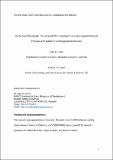Files in this item
On the same wavelength : the impact of other-generated cues on the reported retrieval processes and qualities of autobiographical memories
Item metadata
| dc.contributor.author | Harris, Celia B. | |
| dc.contributor.author | O'Connor, Akira R. | |
| dc.date.accessioned | 2022-10-17T12:30:12Z | |
| dc.date.available | 2022-10-17T12:30:12Z | |
| dc.date.issued | 2022-04-25 | |
| dc.identifier | 279451000 | |
| dc.identifier | 997bdb04-64d9-40b3-9ba1-160c5e063f74 | |
| dc.identifier | 000785011700001 | |
| dc.identifier | 85130829975 | |
| dc.identifier.citation | Harris , C B & O'Connor , A R 2022 , ' On the same wavelength : the impact of other-generated cues on the reported retrieval processes and qualities of autobiographical memories ' , Journal of Applied Research in Memory and Cognition , vol. OnlineFirst . https://doi.org/10.1037/mac0000030 | en |
| dc.identifier.issn | 2211-3681 | |
| dc.identifier.other | RIS: urn:35F4EA07905DE9CAC2B76788E8218E0A | |
| dc.identifier.other | ORCID: /0000-0002-7943-5183/work/112711416 | |
| dc.identifier.uri | https://hdl.handle.net/10023/26203 | |
| dc.description | This research was supported by an Australian Research Council (ARC) Discovery Early Career Research Award to Celia B. Harris (DE150100396). | en |
| dc.description.abstract | In autobiographical memory cuing studies, self-generated retrieval cues lead to fast, effortless retrieval of rich memories. In everyday life, retrieval cues may often be provided by other people. We compared self-generated cues to other-generated cues, in terms of their impact on retrieval processes and memory qualities. In Experiment 1, participants were romantic couples. In Experiment 2, participants were pairs of strangers. Participants generated personalized cues (people, places) either for themselves or their experimental partner. Participants then retrieved autobiographical memories to personalized and generic cues. For couples, both self- and other-generated cues yielded higher rates of direct retrieval and richer memories than generic cues. For strangers, other-generated cues were less effective than self-generated cues and yielded less rich memories. Findings support the possibility that close family and friends have a particular ability to cue our memories, by providing us with autobiographically relevant cue content that yields fast, effortless, and rich remembering experiences. General Audience Summary Retrieving the memory of a specific event from our life can be cognitively demanding, and gets more challenging as we get older. However, research suggests that the cues or prompts that initiate retrieval are important in determining the processes involved in memory retrieval as well as how rich the recalled memories are. Particularly, research has shown that the processes of retrieval are made easier and the memories recalled are richer when people are provided with personalized cues, relevant to their life, that they have generated for themselves, such as names of familiar people and places. In the current research, we tested whether other people can be sources of effective memory cues for each other. In Experiment 1, we compared retrieval processes and memory qualities when people generated their own cues versus received cues generated for them by their romantic partner. In Experiment 2, we compared retrieval processes and memory qualities when people generated their own cues versus received cues generated for them by a stranger. Overall, we found that for intimate couples, other-generated cues were just as effective as self-generated cues, leading to high rates of direct retrieval as well as richer, more vivid recollections. In contrast, other-generated cues from strangers were less effective than self-generated cues. These findings support the idea that people who know us well and have shared our life story with us may have a special ability to cue our memories. | |
| dc.format.extent | 12 | |
| dc.format.extent | 839171 | |
| dc.language.iso | eng | |
| dc.relation.ispartof | Journal of Applied Research in Memory and Cognition | en |
| dc.subject | Autobiographical memory | en |
| dc.subject | Relationships | en |
| dc.subject | Retrieval cues | en |
| dc.subject | Direct retrieval | en |
| dc.subject | BF Psychology | en |
| dc.subject | NDAS | en |
| dc.subject | AC | en |
| dc.subject.lcc | BF | en |
| dc.title | On the same wavelength : the impact of other-generated cues on the reported retrieval processes and qualities of autobiographical memories | en |
| dc.type | Journal article | en |
| dc.contributor.institution | University of St Andrews. Institute of Behavioural and Neural Sciences | en |
| dc.contributor.institution | University of St Andrews. School of Psychology and Neuroscience | en |
| dc.identifier.doi | https://doi.org/10.1037/mac0000030 | |
| dc.description.status | Peer reviewed | en |
This item appears in the following Collection(s)
Items in the St Andrews Research Repository are protected by copyright, with all rights reserved, unless otherwise indicated.

